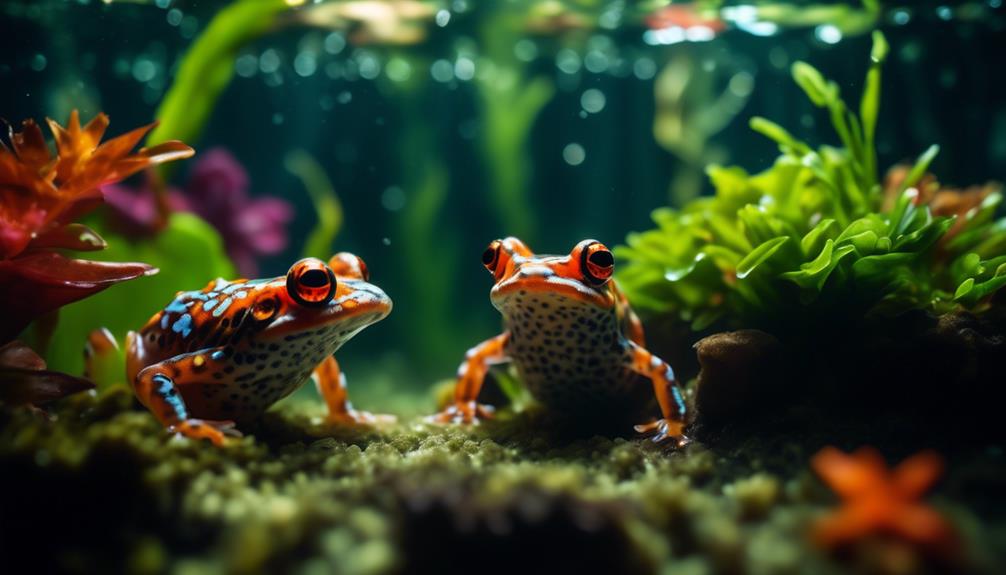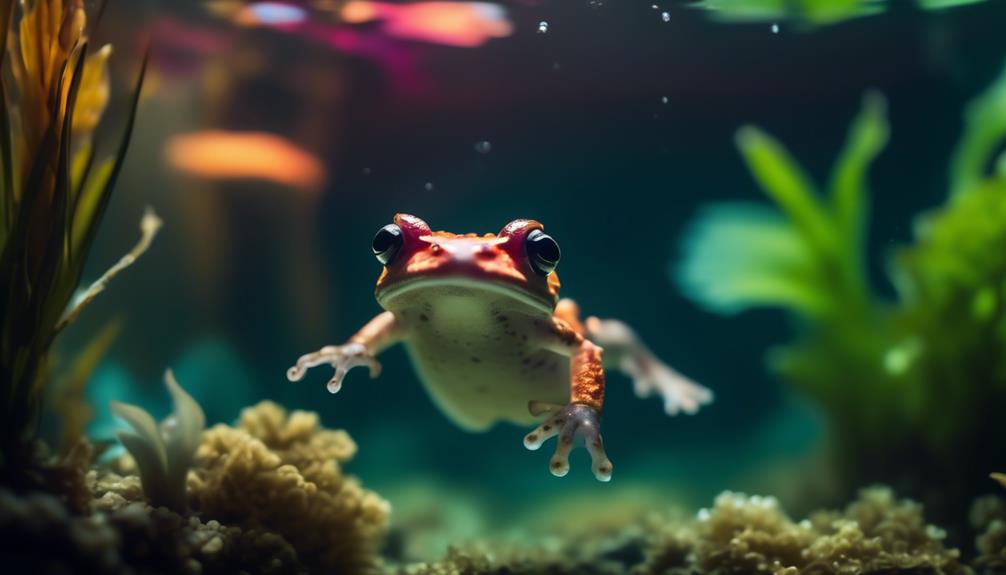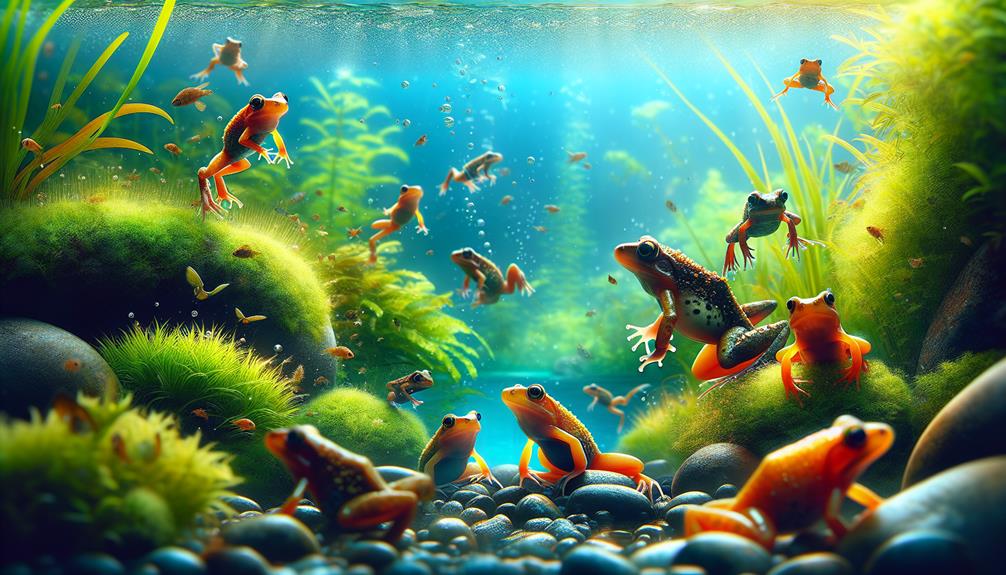Welcome to the fascinating world of African Dwarf Frogs, where seemingly simple creatures can hold secrets that unlock the key to their thriving existence.
These petite amphibians have captured the hearts of many, but their care requirements remain a mystery to some.
Today, we embark on a journey of discovery, peeling back the layers to reveal the secrets behind their nutrition and behavior.
From the delicate art of feeding them to understanding their intricate mating rituals, we will uncover the steps necessary to ensure the success of these diminutive creatures.
So, prepare to be captivated as we unravel the enigma of thriving Dwarf Frogs, revealing the hidden knowledge that will elevate your understanding and care of these mesmerizing creatures.
Key Takeaways
- African Dwarf Frogs are finicky eaters and require high-quality food options such as frozen bloodworms or live black worms.
- Feeding them food that does not disintegrate quickly helps keep the tank cleaner and promotes the health of the frogs.
- Frogs hugging each other is a normal behavior indicating mating, and raising tadpoles requires sufficient space and protection from fish.
- Proper feeding and care, along with investing in a larger tank, contribute to the thriving and happiness of African Dwarf Frogs.
Feeding Dwarf Frogs
Feeding Dwarf Frogs requires careful consideration of their finicky eating habits and the need for food that remains intact in the water.
These African Dwarf Frogs are known to be slow eaters, making it essential to provide them with a diet that can withstand the water environment without disintegrating quickly. The best options for their food include frozen bloodworms or live black worms.
Frozen bloodworms are commonly used and do not disintegrate rapidly, while live black worms offer a longer-lasting food source. These black worms bury themselves in the tank's gravel and are rich in protein, promoting the overall health of the dwarf frogs.
It is important to supplement their diet with high-quality food to keep them happier and maintain a cleaner tank. Avoid using food pellets as they tend to dissolve rapidly.
Additionally, consider the feeding frequency for dwarf frogs to ensure their nutritional needs are met. By providing the right food and following a proper feeding schedule, these little creatures can thrive and lead a healthy life.
Food Options for Dwarf Frogs
Frozen bloodworms and live black worms are the top food options for dwarf frogs, providing them with a diet that meets their nutritional needs and remains intact in the water environment. Frozen bloodworms are commonly used and do not disintegrate quickly, making them a popular choice for feeding dwarf frogs. However, freeze-dried bloodworms can also be used as an alternative, although they tend to float and may not stay in the water as well as frozen bloodworms.
Another option is live black worms, which are a longer lasting food source. These worms bury themselves in the tank's gravel, making them easily accessible for the frogs to feed on. Additionally, black worms are high in protein and promote frog health.
It is important to provide high-quality food for dwarf frogs, as it keeps them happier and the tank cleaner. Food pellets are not recommended as they dissolve rapidly, leading to a higher concentration of waste in the tank.
Importance of High-Quality Food

To ensure the overall well-being and vitality of African Dwarf Frogs, the importance of providing them with high-quality food cannot be overstated. When it comes to feeding these finicky and slow eaters, two main options stand out: frozen bloodworms and live black worms.
While both are suitable choices, frozen bloodworms have some advantages over live black worms. Frozen bloodworms do not disintegrate quickly, ensuring that the food source remains in the water for a longer period. Additionally, they are convenient to store and use.
On the other hand, live black worms are a longer lasting food source and are high in protein, promoting frog health. Regardless of the food choice, it is crucial to maintain clean and healthy tank water for the well-being of the dwarf frogs.
Regular water changes, proper filtration, and avoiding overfeeding are important tips to keep the tank water clean and maintain optimal frog health.
African Dwarf Frog Behavior
African Dwarf Frog behavior is characterized by various distinct patterns and actions that provide insights into their natural instincts and social interactions.
One notable behavior is frog mating, which can be observed when frogs hug each other. This behavior is particularly common among female frogs, which are wider, and male frogs, which are skinnier. It is important to note that smaller frogs hugging larger frogs is not a cause for concern.
Additionally, raising tadpoles requires sufficient space and protection from fish, as most fish will attempt to eat frog eggs. Providing a suitable environment for frog mating and raising tadpoles is crucial in ensuring the successful reproduction and survival of African Dwarf Frogs.
Care Guide for African Dwarf Frogs

Proper care and maintenance are essential for ensuring the health and well-being of African Dwarf Frogs. To provide the best care for these aquatic creatures, it is important to understand their specific needs and create an optimal environment.
Here are five key aspects to consider when caring for African Dwarf Frogs:
- Raising Tadpoles: Providing sufficient space and protection from fish is crucial when raising tadpoles. Most fish will attempt to eat frog eggs, so it is important to keep them separate.
- Proper Tank Setup: Creating a suitable habitat is vital for the well-being of African Dwarf Frogs. This includes maintaining the right water temperature, using a filtration system to keep the water clean, and providing hiding places such as plants and rocks.
- Regular Water Changes: Regularly changing the water in the tank helps maintain water quality and prevents the buildup of harmful substances. It is recommended to change 25-50% of the water every week.
- Balanced Diet: Feeding these finicky eaters a high-quality diet is essential for their health. Frozen bloodworms and live black worms are excellent food options, as they provide necessary nutrients and do not disintegrate quickly.
- Observation and Interaction: Regularly observing the behavior of African Dwarf Frogs allows for early detection of any health issues. Interacting with them through gentle handling and providing enrichment activities can also enhance their well-being.
Frequently Asked Questions
How Often Should I Feed My African Dwarf Frogs?
Feeding frequency for African Dwarf Frogs depends on their age and size. Generally, they should be fed 2-3 times a day with a diet consisting of frozen bloodworms or live black worms. Providing high-quality food ensures their optimal health and well-being.
Can I Feed My Dwarf Frogs Other Types of Food Besides Bloodworms and Black Worms?
Feeding alternatives for dwarf frogs include frozen bloodworms, freeze-dried bloodworms, and live black worms. However, it is important to note that these options meet the nutritional requirements of the frogs, ensuring their health and well-being.
What Are the Signs of a Healthy African Dwarf Frog?
Signs of a healthy African dwarf frog include active behavior, clear eyes, intact limbs, and a smooth, moist skin. Proper tank setup with clean water, appropriate temperature, and a balanced diet are essential for maintaining their health and preventing common diseases.
How Can I Create a Suitable Environment for Breeding African Dwarf Frogs?
Creating a conducive breeding environment for African dwarf frogs involves providing sufficient space and protection from fish. Raising healthy tadpoles requires careful monitoring and controlling of water conditions, temperature, and providing a varied diet to support their growth and development.
Are There Any Specific Water Parameters That Are Important for the Health of African Dwarf Frogs?
Water quality is crucial for the health of African dwarf frogs. Maintaining proper tank setup with clean, dechlorinated water, a temperature range of 70-78°F, and a pH level around 6.5-7.5 promotes their overall well-being and longevity.
Conclusion
In conclusion, providing African Dwarf Frogs with high-quality nutrition is essential for their overall well-being. By understanding their finicky eating habits and offering appropriate food options, we can ensure that these delicate creatures thrive in their aquatic environment.
Additionally, learning about their unique mating rituals and the challenges of raising tadpoles enhances our understanding of their behavior. By following our care guide, you can provide a healthy and happy life for your African Dwarf Frogs.
Interestingly, studies have shown that a well-balanced diet can significantly increase the lifespan of these fascinating amphibians.

